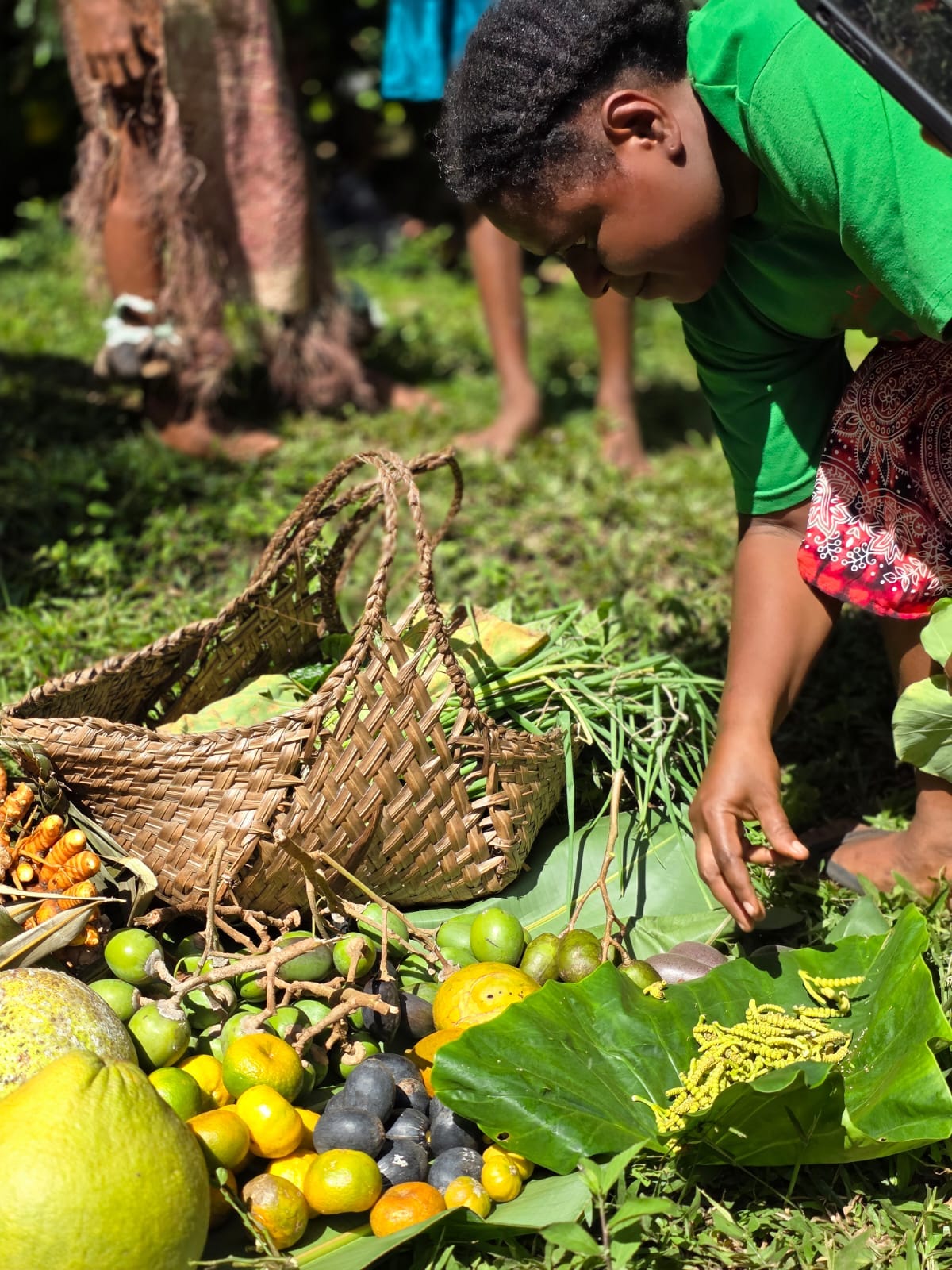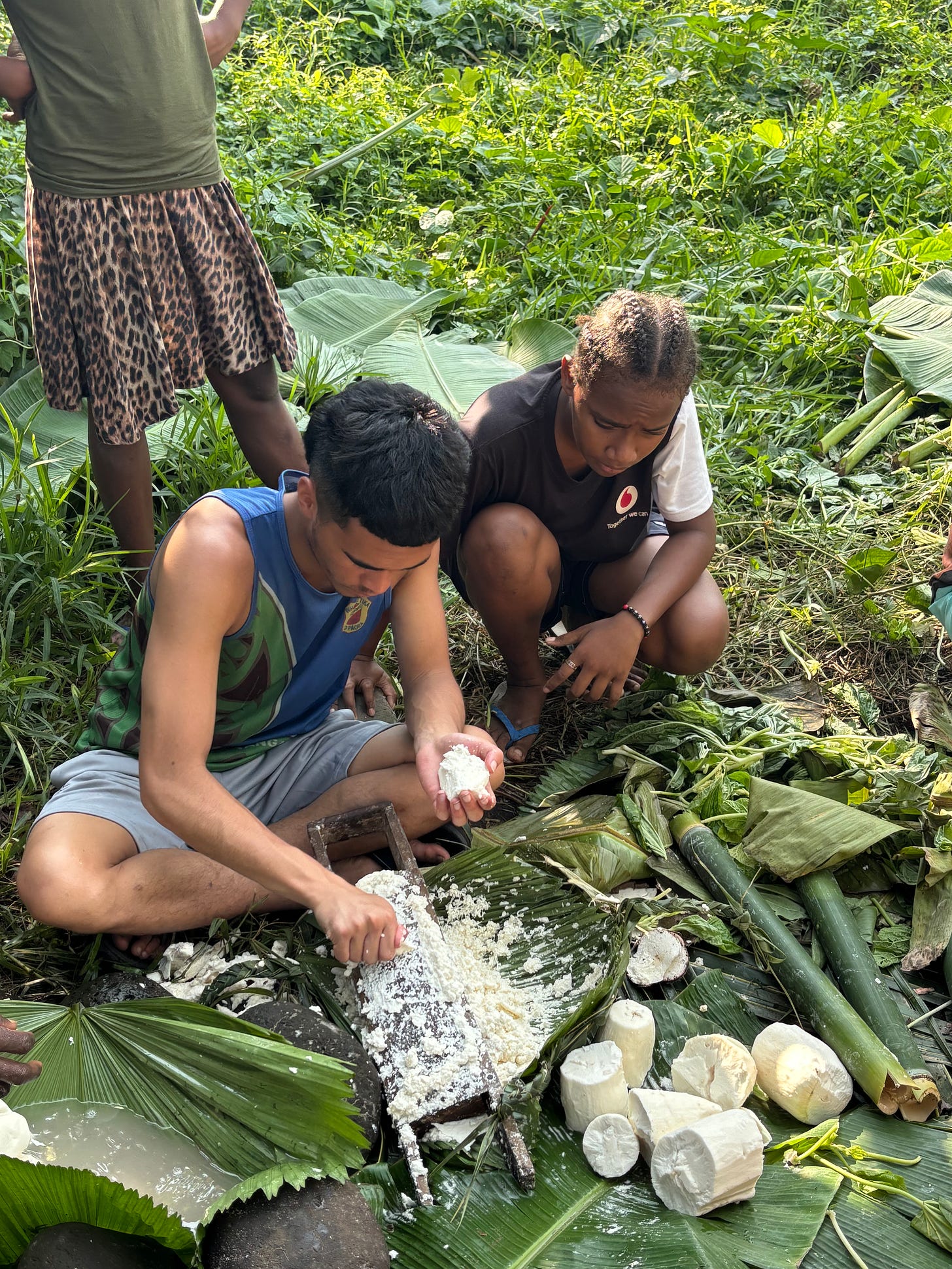The Transformative Effect of the Tri-Nations Exchange: A Regenerative Journey Led by Indigenous Youth
An honest conversation about what it means to regenerate and transform, and why our young people are the natural leaders of this movement.
If you’ve been connected to our organisation and our journey for awhile, you’d know that the language of ‘regeneration’ and ‘transformation’ are integral to what we do. Embedded in every program, partnership, exchange, meeting, and conversation – Regenerative Vanua pushes constantly for the deep unlearning and discomfort required to overhaul broken systems – so that we can then reconnect, remember, and relearn in order to regenerate. We have been operating long enough now to have witnessed various individuals and groups go through this unlearning – and it’s important to acknowledge that our staff undergo this process constantly through the work that we do. It is never easy. It is always messy and confronting. There is anger and grief, a deep sense of loss, confusion, hopelessness, fear, blame and guilt. The cure, the moment of healing every time, is connection to each other, to land and water, to spirit, to culture, and to ancestors. It is a sense of belonging which can only be truely cultivated if there is a coexisting sense of responsibility. Of radical responsibility.
It is obvious that the current industrial and commercial model of travel and tourism are completely void of this sense of radical responsibility. There is instead a sense of entitlement – with my money, I can enter into any space I choose, and behave however I wish. Under this model, I arrive with expectations to a place I may have never been before and know nothing about, and I complain when these expectations aren’t met. I arrive with a stubborn and unyielding sense of what I want, and with a complete lack of understanding of what I need, and perhaps more importantly, what the place that I am visiting needs.
At the core of Regenerative Vanua is the desire to support Vanua’s to finance their commitment to their own regenerative living systems, and to support the collective wellbeing of the Vanua. Working within each Vanua’s inherited and traditional stewardship, custodianship and guardianship practices – the collective aim is to restore pride in Indigenous food and cultural systems by promoting and facilitating regenerative agritourism and regenerative gastronomy. A welcome secondary purpose of our organisation which has emerged from this founding purpose is to build deep connections between hosts and visitors, allowing for transformation, regeneration and a lasting sense of responsibility in those who engage in these exchanges/experiences.
For those who aren’t familiar with the term:
Vanua is a holistic term for place used in Pacific countries (with regional linguistic variations such as Belau, Fanua, Fenua, Fonua, Hanua, Henua, Honua and Whenua) and refers to the relationship between custodians of the land and the land itself, to the energetic aspect of this relationship which creates a sense of belonging to place. Vanua is the relational principle referring to life in all its various manifestations – land, waterways, oceans, air, flora, fauna, weather, people, language, song, dance, stories and so on. Vanua extends across time – it is informed by ancestral knowledge and embodies the needs of the future generations. It is dynamic and evolves to enable harmony and balance. In the Pacific, we understand that the role of being a custodian involves taking care of and stewarding Vanua, so that its full potential – environmentally, socially and spiritually – can be actualised.
Regenerative Vanua rejects the notion of Vanuas as destinations. It is fundamental to us that those Vanuas with which we engage and partner with are understood as living systems – as homes – and that the people who generously offer to host visitors are acknowledged as facilitators of transformational experiences, of regenerative experiences. Hosts are able to facilitate intercultural learning exchanges in regenerative living, and inspire moments of radical responsibility. To connect us back to what we truely need ourselves, to what the Vanua needs and how we can contribute while we are there (and beyond), to what our own Vanua or home needs, and to what the world, what our future – our young people – need.
The Regenerative Vanua Stewardship Framework proposes that this way of hosting, which needs to be acknowledged as fundamentally different and even in direct contrast to the current tourism model, should be referred to as ‘Regenerative Intercultural Hosting’ – which is based on self-determined and governed stewardship of Vanua. This framework (which will be released in an upcoming book chapter ‘Ol Vanuas Blong Yumi Oli No Ol Showgrounds Blong Ol Turis!/Our Vanuas are not destinations!’ due to be published by Channel View in early 2026) enables Indigenous peoples to maintain deep connection to and stewardship of their Vanuas, and to share this connection with visitors through regenerative and transformational experiences. The Regenerative Stewardship Framework is a tool for decolonisation and climate justice in ways that tourism cannot be, as it asserts that Ol Vanuas Blong Yumi Oli No Ol Showgrounds Blong Ol Turis! (Our Vanuas are not destinations!) – a sentiment which aims to disentangle Vanuas from tourism’s patterns of resettlement, reoccupation, and reinhabitation.
The Tri-Nations Youth Exchange marked the first in a series of Regenerative Journeys through Vanuatu’s Penama Province — a ten-day voyage by traditional waka hourua, guided by Indigenous youth and elders, and grounded in cultural exchange, healing, and intergenerational learning. Designed using the Regenerative Vanua Stewardship Framework’s model of Regenerative Intercultural Hosting, this journey was led by the hosting Vanuas and grounded in their traditional food and cultural systems. Through a partnership between Regenerative Vanua, Native Nations, and WAITOC, the journey brought together Indigenous young people from the hosting Vanuas in Vanuatu, along with Indigenous youth from Aotearoa and Australia – and participants travelled between Vanuas, staying with regenerative agritourism operators, engaging in traditional food practices, farming systems, and storian – sharing knowledge, stories, and connections across nations. The idea was that this exchange would lay the foundation for ongoing journeys – allowing future participants to follow in the footsteps of the Indigenous youth – staying in Vanuas, learning from Indigenous hosts, and contributing to the continuation of land-based knowledge systems.

The importance of having young people lead this journey was reaffirmed constantly. Their resilience, their openness, their courage, their selflessness, their morality, their creativity, their ingenuity and their ability to listen and connect was what cracked open the heart of the journey and allowed such deep conversation and transformation. Their spirit saved the group in tough moments, their maturity and ability to sit in their own discomfort allowed for our hosts to genuinely share their lives with us, to receive us in a sovereign and self-determined way. They demanded nothing, they led with curiosity and heart. They stood proud in their culture and respectfully engaged with the cultures of others. This position that these young people demonstrated and held is the only way to truely transform and regenerate. Without this position, without this lens, nothing lasts, and there is no fundamental shift. You go home and resume as normal. Comparatively, as one of our young people shared, “my biggest challenge hasn’t been on this journey but is yet to come, because I have to go back to a different life – the version of myself that arrived here is dead, and gone.”
It was big. It was emotional. It wasn’t perfect. It was challenging and pushed us towards and beyond our limits. In terms of generating a felt and deeply embodied connection to what the experience was actually like, we don’t think we can improve upon Native Nations co-founder Nadine ToeToe’s reflection, so we are sharing it here…
“Limited Wi-Fi. No shops, no takeaways, no supermarkets. No fast food, no flashing screens, no social media, no rush, no need to be anywhere but the present. We stepped out of the noise and into the heartbeat of a land still deeply connected to its ancestors, customs, and community.
We journeyed across the Moana on traditional waka hourua and a support vessel — following the paths of our ancestors, carried by ocean winds and ancient wisdom. We weren’t just travelling; we were remembering. Returning. Reconnecting.
To eat here, you must earn your kai. You harvest. You fish. You kill. You butcher. You prepare. You light fires. You cook together, and then you share. There’s no popping to the shops or grabbing takeaways. And it’s all the richer because of that. We ate what the land and sea provided — fresh fruits, vegetables, wild meats, water from natural springs, and plants that heal.
Children played outside, barefoot and free, thriving in fresh air and imagination. They were active, alert, involved in every part of village life. There were no iPads, no endless screen time, no pressure to wear brands or compete. Time was fluid. No one was “late” because no one was rushing. They live by the sun, the tides, the earth — not the clock.
Communal living is alive and well. Custom and tradition are strong. We sat through ceremonies, participated in welcomes, prepared food, planted, harvested, and learnt traditional ways of gardening, cooking, weaving, and more. We met chiefs, ministers, and elders. We were showered in the riches of the land — gifts from their hands and hearts, made with love and pride.
We slept on the ground, in simple accommodation — some without doors, some without flushing toilets or showers. In one village, they spent three weeks building two new huts and handmade bunk beds just for our visit, using only the natural resources around them. That level of preparation and care is almost impossible to comprehend.
We didn’t come to take. We came to be. To sit, to listen, to learn. To observe and grow. And in doing so, we were transformed.
This experience isn’t for everyone — and it shouldn’t be.
So when people say they want an “authentic” experience — do they really?
Do they mean no hot showers? No wifi? No luxuries?
Do they mean sleeping on the ground and sharing kai harvested by hand?
Do they mean sitting in ceremony for hours, not fully understanding the language, but feeling it in your bones?
Do they mean giving up control, comfort, and certainty — and surrendering to the rhythm of the Vanua?
Because that’s what authenticity is. It’s not a show. Not a product. It’s a way of life.
And I’m glad this is not for everyone. Because not everyone should be allowed to experience this sacred way of being. This is for the ones who come with humility. With deep respect. With reverence for what is not theirs, but shared with them — carefully, intentionally, and rarely.
The balance here is fragile. The ecosystems delicate. The traditions precious. And the people extraordinary.
We were blessed. We were moved. We were changed.
With deep reverence and from the bottom of my heart, I thank the tangata of the Vanua for hosting us with such unwavering grace, purity, humility, and love — in the most sacred, respectful, and profoundly traditional way. It was an honour beyond words.”
This isn’t the last you’ll be hearing about the Journey. We’ll be sharing more in depth stories of what we learned, experienced and felt across the three islands, on the waka, and from each other. You’ll be able to watch the documentary filmed by Native Nations when it’s released. But we wanted to share this first, so that you can understand the framework, so that you can understand that what you are seeing when we share is not a holiday or a reprieve, but an intercultural exchange designed and led by Vanuas, with the purpose of regeneration and transformation. It is a privilege and an honour, and it comes with deep responsibility. We want to make sure we honour this responsibility by sharing thoughtfully, meaningfully, intentionally, respectfully.
Tankiu tumas.




